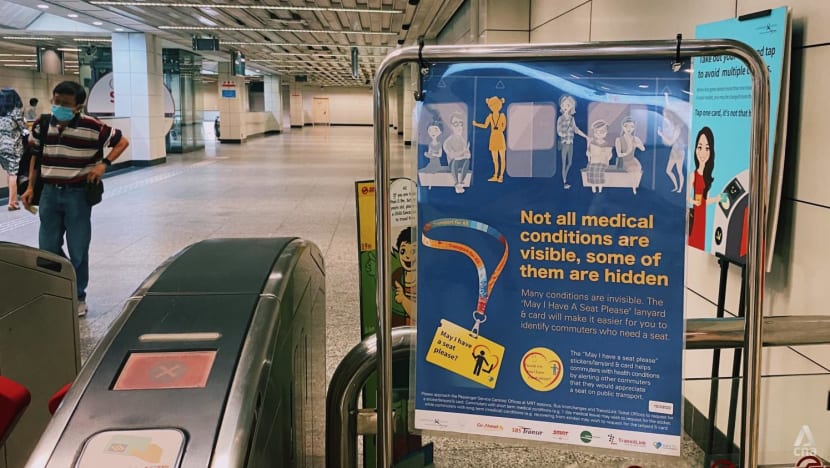Doctor's letter not required for 'May I have a seat please?' sticker or lanyard, say public transport operators
Commuters are also not required to show "proof" of their condition or disability.

A notice informing commuters about the "May I have a seat please?" initiative at Tiong Bahru MRT station. (Photo: CNA/Grace Yeoh)
SINGAPORE: A doctor's letter is not required for commuters to receive a "May I have a seat please?" sticker or lanyard, public transport operators told CNA on Thursday (Mar 9).
Commuters who need the sticker or lanyard are also not required to demonstrate "proof" of their condition or disability.
Public transport operators were responding to queries after a CNA reporter's experience with the lanyard led several netizens to share their difficulties faced in obtaining the sticker or lanyard.
Launched by the Land Transport Authority (LTA) in 2019, the “May I have a seat please?” initiative aims to help commuters with less visible health conditions or disabilities alert others that they would appreciate a seat on public transport.
These conditions range from dementia and autism to heart and limb conditions.
While the initiative started out with stickers issued to commuters in need, reusable lanyards were rolled out in 2021.
Public transport operators reiterated that commuters who need a sticker or lanyard can collect them from passenger service centres at MRT stations, bus interchanges or TransitLink ticket offices.
"There is no need to show any doctor’s note or proof of condition to receive the card," a spokesperson from Go-Ahead Singapore said.
"Aimed at enhancing the journey experience of people with invisible conditions or disabilities, this seeks to remove barriers in getting a card and makes the process accessible for those who need it."
In response to a parliamentary question in February about the training that public transport operators receive to accommodate commuters with various disabilities, Transport Minister S Iswaran said that they have "training programmes, developed in consultation with various social service agencies, to equip their staff with the skills to look out for and assist commuters with disabilities, including those with invisible conditions".
CNA understands that some staff may ask about the condition to assess whether to hand out a sticker or lanyard.
If the individual needs a seat on public transport just for that day, for instance, a sticker may be given. But if the individual has a more long-term condition, a lanyard may be given instead.
If there are no lanyards available, staff will check if there is available stock at the station where the commuter would exit. Staff will also take down their details and contact them when the lanyards are available.
A Facebook post by Caring SG Commuters on Feb 24 also highlighted that the sticker "is more suitable for people with short-term medical conditions".
"If you are unable to get the immediate attention of other passengers, you may wish to approach someone and show them the card," the post added.
"However, do understand that some other commuters may also require a seat during their commute."
As of end-2022, about 8,500 stickers and 5,500 lanyards had been distributed.















